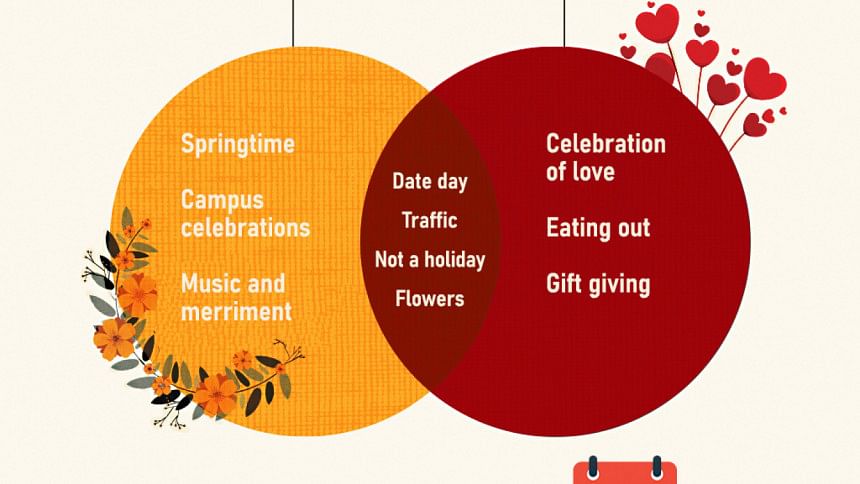Pahela Falgun, Valentine's Day: '2 days' in 24 hours

In recent memory, Pahela Falgun, the first day of spring according to the Bangla calendar, has fallen on February 13… or has it?
Turns out, it was merely our dependence on the Gregorian calendar that led to this day always being celebrated on a fixed date. If we look at the Bangla calendar, Pahela Falgun has actually fallen on February 14 for the past two years, and in the years from 2013 to 2016.
Rajib Kumar Saha, an officer at Bangla Academy's lexicography and encyclopaedia department, explained how there was always a discrepancy between the two calendars. "Previously, each month from Baishakh to Bhadra had 31 days, while Ashwin to Chaitra had 30 days. On leap years, Falgun had 31 days."
"There has been a lot of confusion regarding which calendar to follow for which occasion. It was always easier for everyone to follow a fixed date under the Gregorian system, but that often led to forsaking the accurate Bangla date," said Rajib.
"For example, Ekushey would sometimes fall on Falgun 9, and sometimes on the previous date. The same would happen for Pahela Baishakh, with the day sometimes falling on April 14, and often on the next day," he added.
In order to settle the matter once and for all, Bangla Academy and the Ministry of Cultural Affairs introduced a revised Bangla calendar for the country last year, in which Baishakh to Ashwin consists of 31 days, while the next six months, except Falgun, have 30 days. Falgun will only have 30 days on leap years.
"This revision locks the Bangla dates for days that are historically significant. February 21, March 26, and December 16, will always fall on Falgun 8, Chaitra 12, and Poush 1, which were the original Bangla dates in 1952 and 1971. This will also ensure fixed dates for the Bangla New Year, Rabindra Jayanti, and Nazrul Jayanti," said Rajib.
While this revision has kept all other dates unchanged from their typical day of celebration, Pahela Falgun will officially never fall on February 13 again.
People are finding it difficult to accustom themselves to the changed date, especially since it now coincides with the globally-celebrated Valentine's Day, an event that's completely different in terms of culture, nature of celebration, theme, and even colour.
Nafisa Khan, a final-year student of economics at Dhaka University (DU), dressed up to celebrate Falgun yesterday. "Pahela Falgun has always been one of my favourite festivals. Tomorrow [the 14th], the city will be overcrowded, there will be too much traffic, and everyone will be confused about what exactly they're celebrating. I want to welcome spring today -- whether the calendar permits it or not," she said.
"I think I'll keep celebrating the day on February 13 every year," Nafisa added, happily roaming around the DU campus, along with others who decided to ignore the new calendar.
Nafisa's sentiments were echoed by multiple others, who feel that February 14 has already been branded as Valentine's Day, a western celebration for love -- whereas Pahela Falgun has an entirely different theme of welcoming spring in vibrant colours.
An affinity for flowers is one of the few things in common between the two celebrations. "Sales during the off-season are around Tk 10,000 per day, and doubles during these two days in February," says Enamul Huq, who has a flower shop in Shahbagh.
Two other shop owners Mahfuz Chowdhury and Mamunur Rashid said they'll improvise depending on demand. As the two days coincide officially for the first time, they're hoping to see an increase in profits.
Twelfth-graders Faria and Onti, seen in yellow sarees at the DU campus, yesterday said, "We're welcoming spring today because we doubt our mothers will agree to let us go out tomorrow -- they still think it's just Valentine's Day."
Meanwhile, Tanvir Ahmed, waiting for his partner before class at DU, said he's happy to celebrate both occasions today. "This is just more economical -- two celebrations in one day means fewer expenses," Tanvir said laughing.
His friend Ishtiaque said the same can be said for traffic, "You'd have to battle two consecutive days of heavy traffic before, now it's all squashed into February 14."
Young people are generally at the heart of these celebrations, and their varied reactions to this change of date shows that there's still a lot of adjustment left to do.
In the following years, we'll get to see how this plays out -- the two occasions could merge, one could trump the other, or people might continue to reject the revised calendar and celebrate on separate days.

 For all latest news, follow The Daily Star's Google News channel.
For all latest news, follow The Daily Star's Google News channel. 



Comments